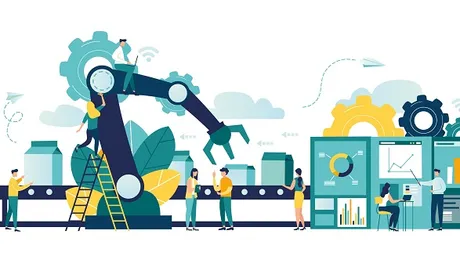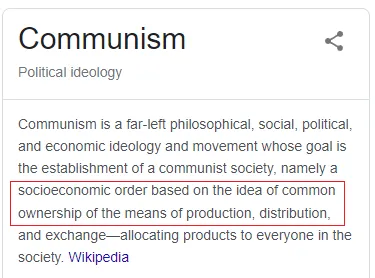
I mean...
Look at all the people that have the most money. How did they get it?
- Jeff Bezos
- Elon Musk
- Mark Zuckerberg
- Bill Gates
- Obligatory famous rich person
How did they get their money?
They got it by leeching value from millions (or even billions) of people in order to line their own pockets. We call this capitalism. We call this "a heathy economy". Not for long. Things are going to change in a big way...
Getting back on track.
There are two ways to become a billionaire, and I'm not aware of any billionaires that only used a single tactic to become one.
1) Leech value from users.
Be it customers buying a product from Amazon, or Facebook (excuse me: META) selling a billion people's data, the customer has to give up more value than they get in return, by design. This is just standard capitalism. It is a system that works. Not a very good one, but better than the dozens of other systems that have never worked/scaled.
2) Leech value from employees.
Anyone that creates a business with thousands of employees can't become a billionaire if they profit-share fairly with all of their faithful servants. A billion dollars divided by a thousand is only a million dollars. No, that won't do. So a system was created to pay employees the least amount possible based on the supply and demand of the current labor force.
The interesting thing about leeching value from employees is that it isn't that much that gets leeched, and it doesn't have to be. Providing compensation to workers is still the number one expense for the vast majority of businesses (especially non-digital ones). Still, if one can leech $1 an hour from a million employees... that's a million dollars an hour that can flow into your own pocket, which can then be leveraged into making even more money somewhere else. Takes money to make money.
Time vampirism strong.
Another thing that is intrinsically implied by all of this is that workers waive their rights (aggressively so) to owning the means of production. We can work our entire lives for a company that builds a product without ever actually owning the product for ourselves. This loss of ownership is the core problem of modern capitalism, and it makes us reliant and dependent on the system for everything, from food to shelter to medical care and everything else in the world.

Automation makes this problem even worse.
It's not a good sign when it's predicted that many of the jobs out there will be outsourced to machines and the only jobs left will be the ones who upkeep the machines. However, it's also interesting that crypto appeared when it did, right in the middle of all of this. Crypto is the solution for the impending systemic collapse of society.
How so?
Again, the problem is ownership over the means of production. Crypto has already solved this, which is actually kind of surprising. You'd think we'd of had to work harder for such a huge gain.
Buy a coin with utility that does something, and we provably own the means of production that is produced from that network. Not only that, but the ownership itself is not delegated to a centralized clearing house or custodian. 'Not your keys, not your crypto' will be a theme that chimes over and over again across the decades. Those who choose to hand their crypto over to others will find it gets stolen one way or another. Time is the only limiting factor in this regard. The longer we delegate, the more we risk.
Speaking of delegation...
This is one of the many reasons why delegated proof of stake is awesome. We can delegate our power away, and if something goes wrong, we just take it back with the click of a button. The difference here is that we still own the keys while we are doing the delegation, and this is a world of difference.
Communism
Cryptocurrency is inherently communist. Why?

Isn't it obvious?
The most basic-bitch Google search confirms this a thousand times over. The problem is the allocation of resources and ownership of the means of production. These are problems that are intrinsically solved by decentralization at a core level. Of course, we can't actually call it 'communism' because that word triggers people and makes them thoughtless and belligerent. Check the comments below for confirmation. They probably stopped reading the second they saw the word 'communism' and didn't even see me calling them out in the next sentence. Happens every time.
However... communism is not inherently left wing: it only becomes that way when the people lording over it have to make all the decisions and allocate all the resources. This is why we need crypto to automate governance itself. Automate ownership, power, and resources. Once that happens we can all make money together and everyone gets rich (in theory)... unlike the mainstream abomination that is known as 'communism' today.
The problem with 'communism' as it is known today is that... it does actually exist. It is not a system that scales with centralized planning, and becomes infested with corruption at the highest levels immediately. Centralized communism can only scale up to a community of a few hundred people before it becomes complete totalitarianism. China need not apply. It's funny that people believe that China is 'communist' just because they use the word 'communist'. Why would you believe anything they say to begin with? Silly. Trust has vacated the building.
Truth is now the most valuable commodity.
And crypto is tapping into that market and farming truth itself with digital ledgers that are backed up a thousand times over all across the globe. Is there a lot more work to be done? Sure. There's always a lot more work to be done. Ants never stop working. The colony must expand.
Capture of value
A big argument to be made in favor of capitalism and all these billionaires running around being billionaires is that they created a lot of value. The problem is that once the value was created they had to capture it to make money and scale up operations. Another way of saying 'capture' value is 'leeching' value (as described at the beginning of the post). Again, crypto fixes this.
Crypto creates a completely new system where value doesn't have to be captured: only created. If I build an app that doubles the value of Hive, then I just doubled the value of Hive, not only for me, but for everyone on Hive. So not only did I just double my money without capturing any value, but I also increased my reputation on the network by orders of magnitude. That reputation can then be leveraged to get even more stuff done (and get proposals funded) that increases the value of Hive even more. These are systems that can snowball in an instant given the right catalysts.

Once the proper templates come into play and sustainable business models are created that no longer need to capture value to scale up, the entire game changes. Add onto this provable ownership of every user that owns tokens, and we can really get the ball rolling.
Conclusion
The only way to become a billionaire within the legacy economy is basically, for lack of a better term: micro-slavery. Our value and our rights get chipped away just a tiny bit within this system. It's easy not to notice at first, but it becomes grossly apparent as time goes on.
Crypto fixes this, in theory. Whether that theory will become a reality is yet to be seen, but I believe we'll get there. No one said it was going to be pretty. Fake it till ya makes it.
Return from How does one make a lot of money? to edicted's Web3 Blog
